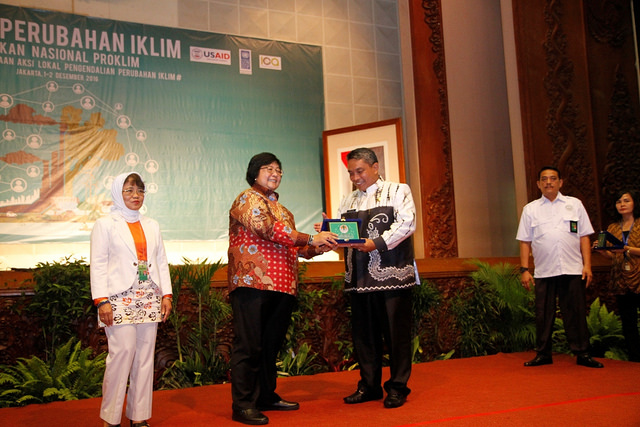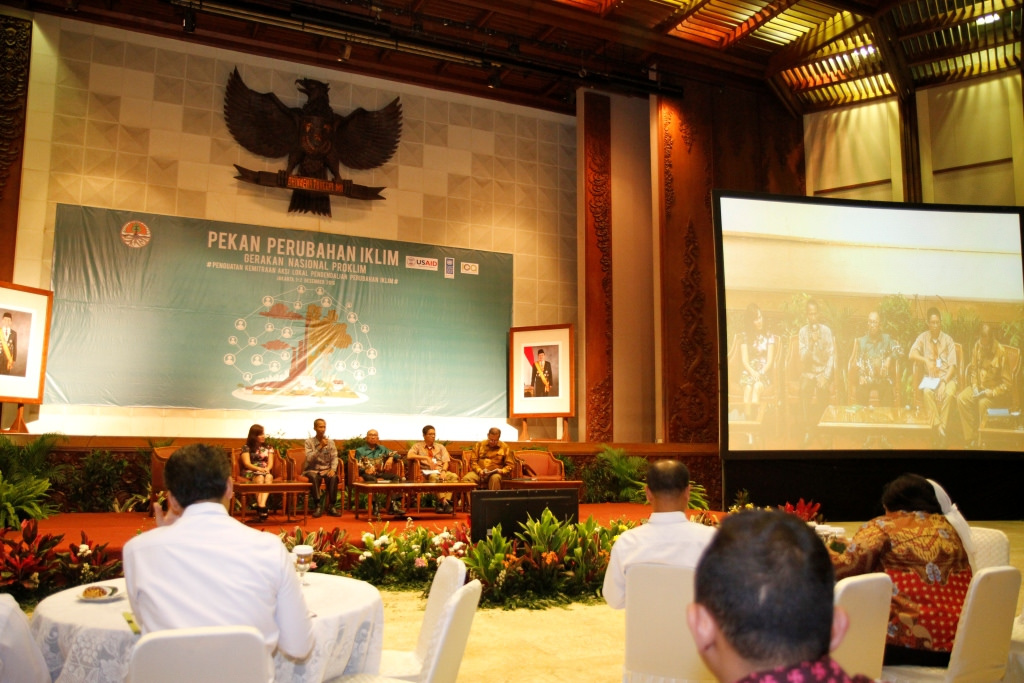Over 200 people attended Climate Change Week 2016, which took place on the 1st and 2nd of December 2016. The event, jointly organized by the Indonesia Climate Alliance (ICA) and the Ministry of Environment and Forestry (KLHK), was held in Jakarta, Indonesia. Participants brought a wide variety of expertise, coming from diverse backgrounds, including senior government officials, academics and researchers, representatives from the media, civil society, and the private sector.
Over the course of the two-day event, participants took the opportunity to share their experiences of building climate change resilience. The event was the culmination of a series of workshops and discussions held since 21 November 2016. These workshops covered several topics including, local governance, planning and budgeting, and integrating gender considerations into climate change resilience building processes, among others.
This article shares some of the challenges that participants encountered during their work, and highlights the solutions that were identified to overcome them. Touching on the themes of ‘leadership’, ‘community innovation’ and ‘knowledge management’ it provides useful lessons for climate resilience practitioners in Indonesia and beyond.
Leadership
Climate change and its impacts are, and will continue to be, a threat to the continued prosperity of Indonesia. In order to foster effective climate change resilience decisive leadership, based on the best available knowledge about climate change, is necessary at both the national and local levels.
Coordination between central and local governments needs to be improved, especially with regards to improving access to reliable, complete climate change data and information. Climate change is a cross-cutting issue that should influence the direction of policy across government departments.
Given the importance of the climate issue, government at all levels must integrate climate change adaptation and disaster risk reduction into their policy and planning processes.
With regards to intergration climate change into planning and budgeting processes, participants identified several requirements:
- Technical policies at the national level related to climate-sensitive program planning, and budgeting process.
- Awareness raising at the local level that can change attitudes and behavior of communities on climate change.
- Funding schemes should treat climate change action not as a cost, but as an opportunity that can be leveraged. This will require collaboration with non-state actors.
- Improved knowledge-sharing is needed among people and organisations operating within their respective regions (horizontal) and also across levels of government (vertical).
Community innovation
Many aspects relating to climate change are closely connected to daily life at the local level. People at the grassroots level are, therefore, the spearhead for achieving climate resilience. Strengthening community networks, requires support from government, as well as initiatives at the local level. However, more ways of promoting and revitalizing local action need to be developed. In light of this the Ministry of Environment and Forestry (KLHK) has developed a programme to improve understanding of climate change and its effects among the general public.
Under the Program Kampung Iklim (ProKlim) the KLHK will assesses community-based initiatives on their efforts to adapt to climate change and support the reduction of greenhouse gas emissions. It is hoped that Proklim and similar community empowerment programs can evolve by providing more thorough assistance to the communities being trained. This might entail developing initiatives that have a sustained, long-term impact and become engrained as part of community culture. Ideally, the program will facilitate the development of local resourced-based technology and further the utilization of locally contextual approaches, knowledge and wisdom.

Siti Nurbaya, the Minister of Environment and Forestry, handed over an award to Banjarbaru City Mayor, Nadjmi, on Banjarbaru's Proklim activity.
Knowledge Management
Provision of data, information and technological support from research institutions and universities, will encourage the development of innovative-solution in the knowledge management field. Various forms of information channels (both conventional and digital) can be further utilized to improve understanding, awareness and community participation in the implementation of the climate change programs.
The effectiveness of these communications channels will be determined by the nature of the dissemination approaches. These will be most effective if they are sensitive to the context of target audiences.
Climate change adaptation and disaster risk reduction rely, to some extent, on the validity and accessibility of accurate data and information. This points to a need for a knowledge management system whose primary function is to serve as a platform for data sharing. Given the complexity of climate data at the sub-national level such a system will only be effective if it is has they buy in of key institutions at various scales. A knowledge management system will be considered successful only if it is able to provides reliable information, that is useful (and useable) for the formulation of local policy.
Conclusion
Climate Week 2016 provided a positive platform for the sharing of new ideas about how to initiate new collaborative relationships that can contribute to climate resilience building at various scales. It is expected that the information exchange facilitated by Climate Week 2016 will help to develop understanding and awareness amongst the general public. It is hoped that this information will provide the spark that will ignite local action on climate change. The discussions at Climate Week 2016 will feed into the Indonesia Climate Alliance’s work program and strategic development, ensuring that the lessons and knowledge shared at the event has real impact.







